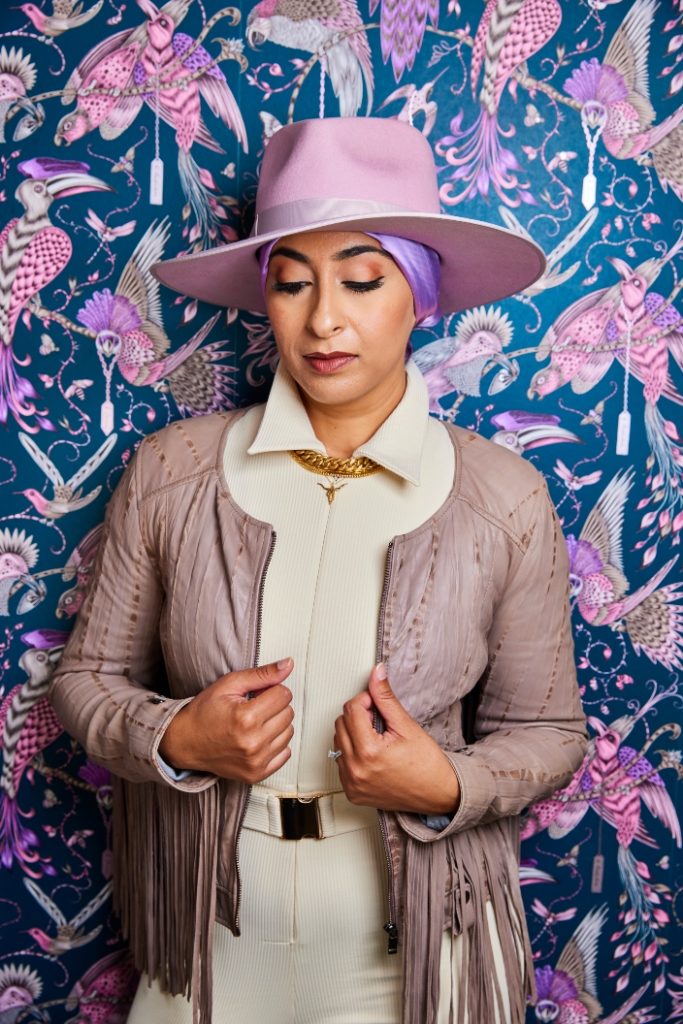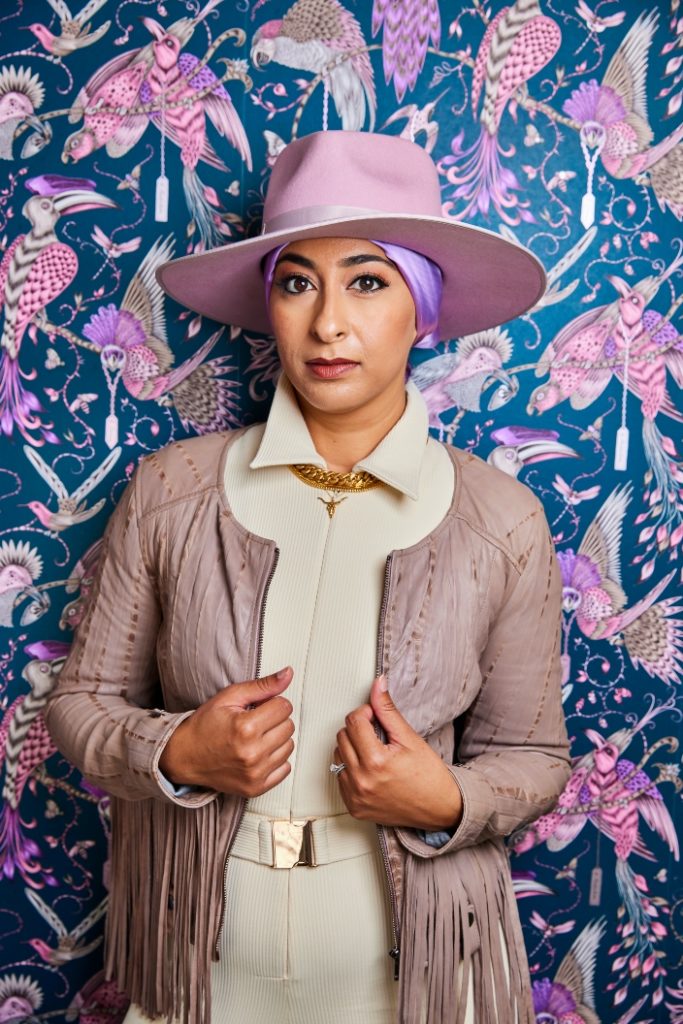Hate crimes, cancer and conflict haven’t quenched Muna Hussaini’s hope.
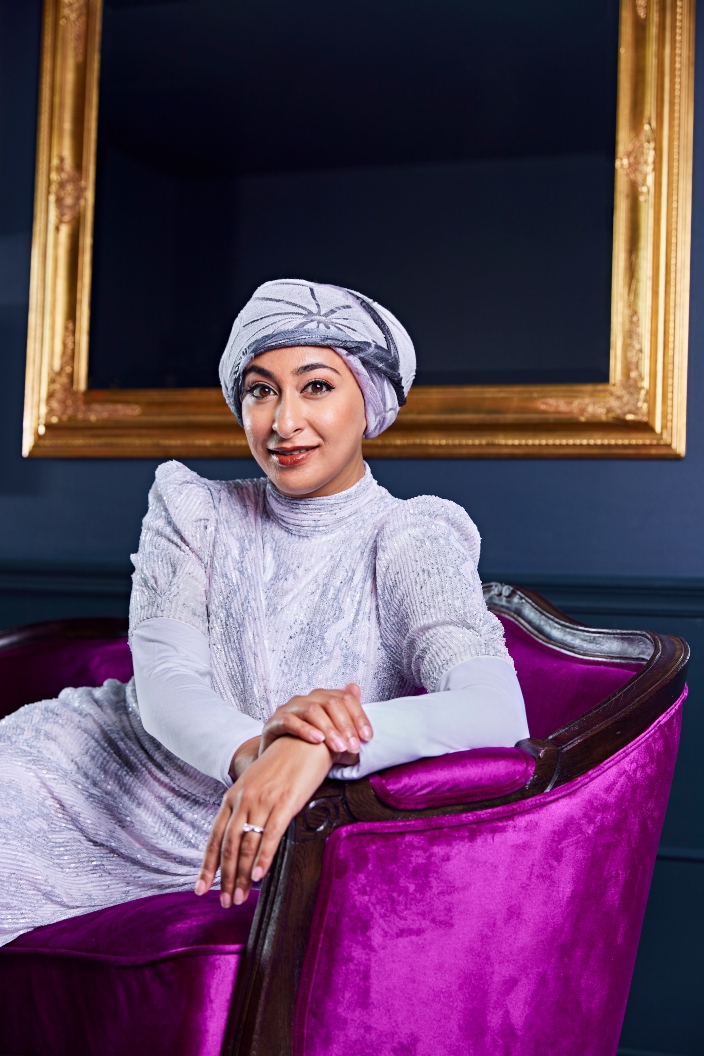
By Hannah J. Phillips, Photos by Annie Ray, Styled by Parke Ballentine with inspiration from Hemline and ByGeorge, Makeup by Sahar Mahmood, Lashes by Tara Smith at Lash Lash Beauty House, Shot on location at The Colton House Hotel
Even over the phone, a first impression of Muna Hussaini renders an aura of calm. There’s a steadiness in her speech and a confidence in her voice. Her spirit is curious, and her response to the occasional interruption of her children oozes compassion.
“No, the cat’s not in here, boo boo,” she says. “Mommy’s on a call. Can I finish my call please?”
The cat in question is a COVID cat, Hussaini explains. Adopted during the pandemic for her 13-year-old daughter and her son. “My 5-year-old monster,” she laughs. The moniker, along with her affectionate tone, speaks even louder than her words on the importance of her family, which she weaves throughout the conversation as a central theme in her life. Outlining her career, she traces her path from a child of immigrants to senior roles at global tech companies like IBM, Paypal and now, Indeed.
Currently serving as the head of ESG Governance at Indeed, Hussaini pinches herself every day that she gets to “change the way the world hires, for good.”
Muna Hussaini: A Path Less Travelled
The path was not mapped out for her. As a Muslim woman working in the tech industry since 2001, Hussaini has faced more than her share of obstacles—physically, spiritually and in her career. None of those hurdles have held her back; none have extinguished the steady flame of hope she holds out to the world with open arms.
“The sun rises every day, and we have to keep going,” she says. “We can’t wait for someone else to build the world we want to see. We have to be doing that work now.”
As Hussaini shares the pivotal moments of her life thus far, she charts how each one defined her. Refining her identity and strengthening her resolve to make the world a better place. Her story begins in Hyderabad, the capital city of Andhra Pradesh in southern India. Her father left in 1973 to pursue his master’s in petroleum engineering at the University of Tulsa in Oklahoma. The Immigration and Nationality Act of 1965, also known as the Hart-Celler Act, had passed just six years before. Fueled by the Civil Rights Movement, the bill forever changed the course of immigration demographics in the U.S. by opening entry to immigrants other than those of Northern European descent.
A Dollar and a Dream
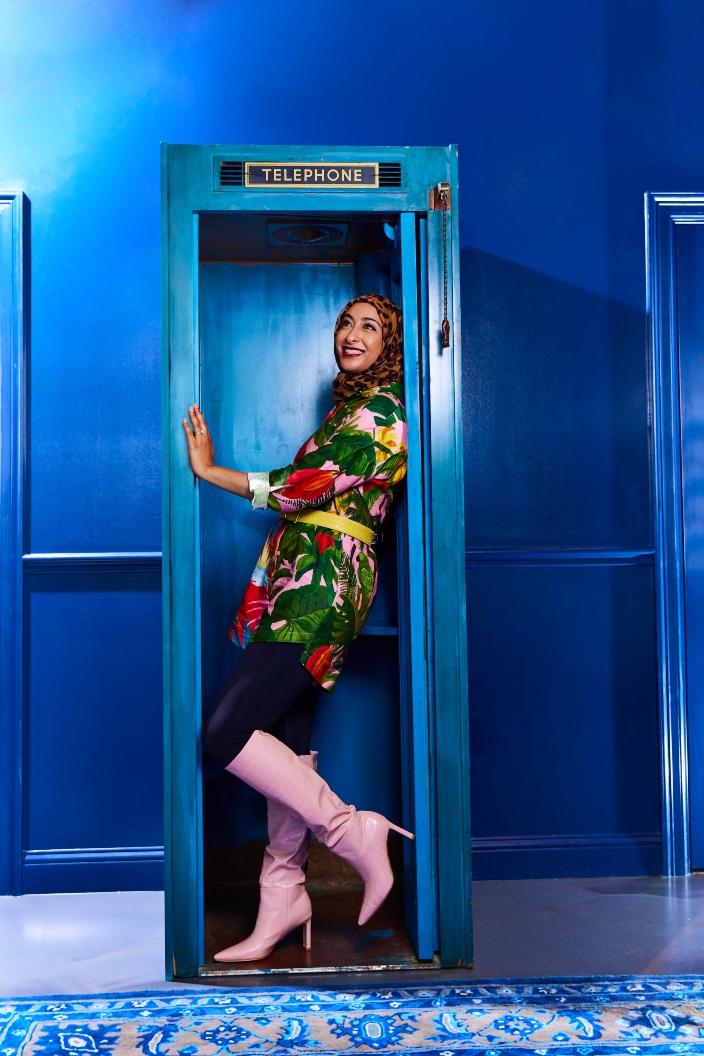
“My parents are the American dream,” says Hussaini. “They literally came with dollars in their pockets.”
Hussaini knows it was hard for her parents to leave their lives in India behind. They arrived in the States before Google, before email and Zoom. She recalls the echo on the line during the occasional long-distance phone call to family members back home.
“They left everything behind,” she says. “I think when you’re trying to retain your language, culture and food, it’s not as easy when you’re sort of swimming against the currents. We’re also Muslim, so I think my parents tried to integrate, not assimilate. They took what they thought was beautiful in American culture and adopted it without losing their own values and tradition.”
Continuing Traditions
Growing up, Hussaini remembers how faithfully her parents not only taught her their language, how to read and write, but how to make their food and follow their customs.
“I didn’t wear shorts, I didn’t date, I didn’t watch 90210,” she laughs. “I’d mope around about it, but my parents would just say, ‘Suck it up; you’re different.’ I think that taught me not to care what anyone else thinks. I love that Brené Brown quote where she says, ‘The comments from the cheap seats don’t bother me at all.’ Those knocks you take when you’re younger helped me be strong in who I am and what I think.”
Hussaini also traces that independence to moving a lot as a kid. Her father’s job as a petroleum engineer took the family all over the world. Born in Pittsburgh, she spent parts of her childhood in Saudi Arabia, Texas and Qatar before finishing high school in Sugarland, Texas.
Her Own Role Model
“I used to be confused by the question of who is your role model, because I didn’t have access to a lot of people,” she says. “I always knew I wanted to have a career, but I couldn’t identify with anyone that I wanted to be like. I feel grateful now because I see who my daughter can look up to. But I always got lost since I grew up in such different places.”
As a child of immigrants, the female role models Hussaini did have were most often homemakers, teachers and doctors. Most of the men were engineers like her father. Studying at the University of Texas at Austin, Hussaini remembers attending a large university hiring event with about a hundred other students. She ended up landing a job with IBM in project management, her first job out of college. Looking back, she marvels at how that one group interview set the course for her career.
“I like group work, but I didn’t go into that interview knowing it could be a job,” she says. “If someone had put me in a different pool, my career would look very different. Somebody made a decision for me right there, and it impacted the rest of my life.”
9/11: The Day the Earth Stood Still
In early autumn of the same year she graduated, another event would have a lasting effect on her life. Hussaini moved to Boulder to start her job with IBM just two weeks before Sept. 11, 2001.
“Everybody in my generation can draw a line and see a [world]before and after 9/11,” she says. “For me, as a visible Muslim woman, it was a huge line.”
With no friends and no family in her new home city, Hussaini vividly remembers the immediate isolation and otherness she felt from that day forward. She recalls everyone in her office watching the news on TV, then turning around to look at her. Within those first few weeks, she became the victim of several hate crimes—at work, at restaurants, even in her car. She was threatened by a colleague and driven off the highway by a stranger.
“I was attacked in public, in broad daylight, in a group of people,” she shares. “Suddenly, all conventional wisdom you follow as a human being to stay safe no longer applies. I don’t know what a typical profile of an attacker is. But these incidents were from an old man on a plane. A mom and her baby filling up their soda in a Taco Bell.”
“I Can’t Hide Who I Am”
Through these experiences, Hussaini drew comfort and strength from the very things that made her stand out in the first place. She attributes her resilience in the face of these traumas to the strong sense of identity her parents instilled in her from an early age.
“I can’t hide who I am,” says Hussaini. “Even if I dress differently, I’m not a white person. My parents gave me such a strong core. I see that theme of standing up whole and complete in my life. The fear and vulnerability stay with me, but I manage it. It’s part of who I am, but it doesn’t define me.”
On the contrary, she harnesses these painful experiences to be a light to others. Hussaini describes her vulnerability less like baggage to drag through life and more like a bird sitting on her shoulder. Always there, but not weighing her down. If anything, her fears from past traumas give her an extra heart for people who experience marginalization of any kind.
“I think my vulnerability makes me wiser,” she says. “It helps me see things I wouldn’t otherwise see. I have zero appetite for watching anyone else get disrespected. As a Muslim, a lot of people criticize me for supporting the LGBTQ+ community. But I’m not going to fight for my own rights and then allow for discrimination against someone else.”
Showing Up Wholeheartedly
Still, it hasn’t been an easy path to healing. In the aftermath of 9/11, Hussaini was grateful to be working at IBM, which has a strong history of diversity and inclusivity. Her boss at the time encouraged her to take time off to see a therapist. Being forced to focus on mental health was another pivotal moment for Hussaini. Setting the tone for the rest of her career.
“When I came back to work, I was able to be much more intentional,” she recalls. “As someone who has been attacked, I don’t think that fear ever leaves you. But you choose to show up anyway. It’s a choice to step into public spaces. But I think the confidence my parents gave me and the clarity I gained from therapy helped me get through.”
Choosing to show up, and doing so wholeheartedly, is as integral to Hussaini’s story as her familial identity. For her, the two themes are interwoven, especially as she now raises children of her own.
“For a long time, we felt like you have to hang up who you are when you go to work. But we have to live our values all of the time,” she says. “My Muslimness is what makes me beautiful at home, in my community and at work. Being a mom makes me a better employee. That theme of coming into your own is a gift in every single one of your spaces.”
Muna Hussaini Takes a Break
Hussaini took a career break after the birth of her first child. Time she will always cherish because it laid the foundation for many of the initiatives that led to where she is today. But beyond career touchstones, she is grateful for that time because slowing down to recuperate is how she discovered her thyroid cancer. During a routine checkup just three or four months after giving birth, her doctor discovered a nodule in her throat. Because they caught it early and because she was still nursing, she didn’t undergo radiation.
“I am really lucky I didn’t have to do chemo,” says Hussaini. “My scar is a badge of honor. It’s easy to armor up. But I had to go through these experiences to figure out how strong I could be.”
She doesn’t take credit for surviving that difficult season alone, though. Hussaini attributes much of the success of her career to having “such a badass husband.” When Hussaini returned to full-time work and didn’t want to start pumping, her husband traveled with her so she could keep nursing.
“Most husbands are not that supportive,” she laughs. “We don’t divide things up at home based on gender, but based on who can do it. We share the laundry, cooking and everything together.”
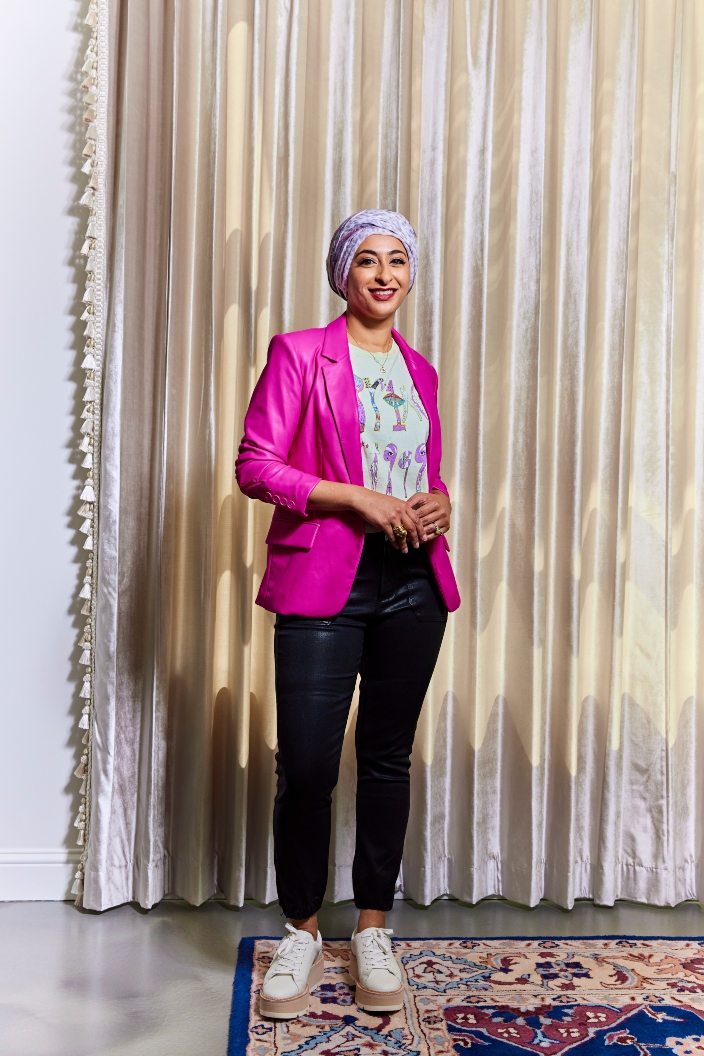
Muna Hussaini Creates the Path Forward
Nonetheless, returning to work was difficult as a new mother. But the experience set the foundation for much of her later work. When she eventually moved into a diversity and inclusion role at Paypal, she built a hiring program targeted at women returning to work after taking a career break. Conducting surveys and comparing participant’s stories with her own experience led to an epiphany.
“I realized that if we get to make the rules for this program and these rules aren’t working for this particular group, why don’t we change them? Why am I in this role if I don’t get to change the rules?”
And that is exactly what she did. The pioneering program restructured how tech companies recruit and hire women returning to work. As the first successful program of its kind for a large corporation, Hussaini’s engagement became the impetus for launching Path Forward, a nonprofit organization helping other companies launch and expand similar programs. Hussaini still serves on the advisory board of Path Forward today.
“It’s probably what I’m most proud of in my career,” she says. “It was just an affirmation that sometimes the systems have to change. But you have to be in a position of power to change them. How do you make all of the systems align to drive change?”
Driving Change
One of the biggest ways to drive change is to create systems of healthy communication and conflict management. Learning to deal with conflict is often particularly difficult for women, she argues, because of certain gender expectations.
“There’s a double bind for women,” she says. “If you’re too strong, you’re aggressive, and if you’re not strong enough, you’re not a leader. I had to learn how to deal with and how to manage expectations in the workplace.”
The key is to develop good communication between bosses and employees. Slipping Brené Brown quotes into the conversation at regular intervals, Hussaini highlights the impact of both negative and positive leadership models on the trajectory of her career.
“It’s important to have a good boss that communicates expectations, or you won’t have a clear picture of what’s going on,” says Hussaini. “But when you give people context, they are empowered to have agency and make their own choices. It’s about putting people in a position to do their best work.”
Good Leadership
Mapping the milestones of her 20-year career, she can still see the impact of good leadership in the choices she made along the way. She attributes her diversity and inclusion role at Paypal to a good boss on her software development team; he not only painted a clear picture, but discovered elements of Hussaini’s potential she hadn’t even noticed in herself. Seeing a new position on the diversity and inclusion team, he tapped Hussaini for the role.
“I had read the job description and wasn’t sure I should apply,” she recalls. “But he kind of proverbially smacked me across the head because I lived it every day. Looking back, it’s amazing to see how much he invested in my career. You can’t just have support, you have to have a sponsor. I wouldn’t have gone looking for that role. So that was a powerful lesson for what you can do for others once you step into a position of power.”
The role marked another major career turn for Hussaini, combining her background in tech with her mission to make the world more inclusive. That blend of experience and passion is also what led to her current position at Indeed. As head of ESG Governance, she is tasked with ensuring that the company delivers on its key environmental, social and corporate governance commitments.
“Our mission at Indeed is to help all people get jobs,” she says. “Within that, we also have to ask what role our company plays in changing how the world works. My role is helping deliver on the commitments we have made as a company, we hope to achieve net zero in greenhouse gas emissions in 2030 where we have the most impact, i.e., business travel and how our employees get to work.
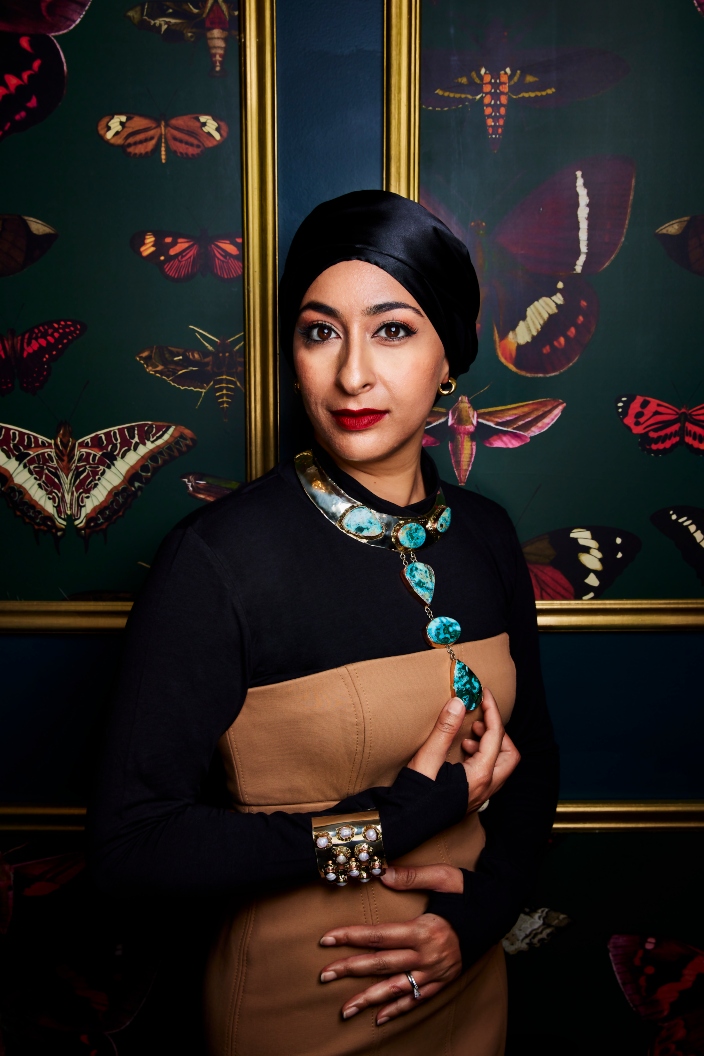
Full Circle
For Hussaini, the job brings her story full circle back to her father’s first job in the States. Despite being one of the top students in his petroleum engineering master’s program, he struggled to find a job until a professor referred him to a visiting friend from Gulf Oil. Landing the job not only impacted her father’s life, but lifted their family out of poverty and gave Hussaini many of the opportunities she has today.
“You don’t just change that one person,” she says. “You change their family and their community. I get to go to work every day and help the whole world.”
Afghanistan: Echoes of the Past
Creating those opportunities remains top of mind for Hussaini, especially as world news continues to look, on the whole, rather bleak. In the time between this story’s initial interview and final draft, U.S. troops left Afghanistan. Shocking images of Afghan citizens attempting to flee the country drew parallels to 9/11, which took place 20 years ago this month. While the media rightly reports on the drastic setback this could be for women in the country, Hussaini shares the reminder that it will have an enormous effect on Afghan citizens as a whole.
“The whole society is impacted,” she says, thinking of the lack of opportunities it could create for families. “I want to live in a world where it doesn’t matter what you believe or where you were born. You have the same opportunities to raise your kids and send them to school and build yourself a life.”
Hussaini holds a steady hope that this kind of world is possible, clinging to her faith and taking time to care for herself in the midst of what often feels like global chaos. Quoting Audre Lorde, she uses the phrase “self-preservation” rather than self-care, which Lorde calls an act of political warfare.
“Taking care of yourself is radical,” says Hussaini, making the quote her own. “Preserving yourself in a system that wants you to drain yourself is a way to push back. I want people around me to find joy. Part of resistance is being joyful.”


